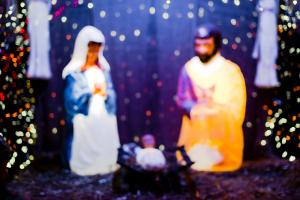I’ve heard complaints from people of faith that go something like this: “Don’t mix up our faith  with politics” or “Don’t get political, let’s just focus on Jesus.”
with politics” or “Don’t get political, let’s just focus on Jesus.”
I do believe the definition of the word “political” is in question in these objections. What does it mean to be political?
I also know that these protests grow silent when we’re talking about issues like abortion and Supreme Court justices. We are very selective about when politics matter to our faith, apparently.
However, it’s Christmas so let’s not get political here.
Yet Christmas perhaps more than any other time is when the Christian faith is at its political zenith.
Christmas, one of the most spiritually formative spaces on the Christian calendar, is inherently political.
For example…
Jesus’ birth announcement says that Mary will have a son and will name Him Jesus, “because he will save his people from their sins.” (Matt. 1:21) No one at the time would thought, “Wow, Mary’s son came so that people could pray and have their spirits leave their bodies and go to heaven one day when we die.”
To “save” the people, in terms of Jesus’ culture and heritage, is the work of those in the book of Judges and the prophets. In Judges, men and women worked to liberate Israel from oppressive nations that gained power because of Israel’s disobedience to their covenant relationship with God (e.g. Othniel in Judges 3:10). It involved war, structure, and treaties – in other words, politics.
Yes Virginia*, to name the boy Jesus (or Jeshua) is to make a political statement.
There was an oppressive empire called Rome standing on the necks of faithful people like those who raised, fed, and clothed Jesus. The announcement of Jesus’ birth is a counter narrative to that empire. The Romans offered Pax Romana, “Roman peace,” which came through allegiance to the Emperor and the death of Rome’s enemies.
Jesus brought something very different.
Mary’s child would dismantle political and religious systems of oppression by lifting women and lepers into the light of life. The Jewish culture around Jesus saw no divide between religion and politics. So when Jesus touched a leper or broke the Sabbath it was both a violation of covenant law and a setback in the quest to see the Messiah come and overthrow the Romans.
Jesus, in that sense, was politically incorrect.
When the Magi came from the East, arriving around Jesus’ 3rd birthday, they went to the seat of local power and started looking for “the King of the Jews.” It wasn’t a purely religious figure they were looking for, but a child whose birth realigned the stars. They were looking for someone powerful, who would reign with celestial-strength authority.
They came to Herod, and Herod’s paranoia burst into flames. But why? If Jesus isn’t political, then Herod has no reason to be suspicious. If Jesus’ trajectory is to simply be a religious figure, a teacher, who will one day be executed by the Romans then Herod’s fear is misplaced.
Instead, the Gospel narrative says he had every boy in the kingdom 3 years old and under killed. Which should serve as a reminder:
When tyrants grow fearful about losing their power and position, no one is safe – not even children.
Yes Virginia, Jesus’ birth radically impacted the political world of his day.
The protest is often, “Yes but he didn’t seek a throne. He didn’t pursue the kingship, in fact he avoided it.” (see John 6:15) True. He did something else, but we’ll get to that in a second.
The Christmas story, honestly, makes no sense whatsoever without the way it critiques the universal story of human politics and power.
Even Jesus title, Jesus Christ, which N.T. Wright accurately translates as “King Jesus” is a combination of “He saves” and “the anointed one.” Both words are political words before they are religious or spiritual words. “The anointed one” is a beautiful metaphor for the Messiah, who was expected to be a king in the truest sense of the word.
That is my primary struggle when we say “faith isn’t political” – especially around Christmas.
What do we make of the fact that some fight to say “Merry Christmas,” but then insist that Jesus and politics don’t mix? Who exactly is taking the “Christ” out of “Christmas” again?
We marvel at the prophecies of Jesus’ birth, even sing them in Handel’s Messiah. All the while the phrase “and the government will be upon his shoulders” remains outside in the cold, peering through the window.
The story of Christmas is a spiritually political story of power, fear, and redemption.
The birth narratives of Jesus are stories of unwanted and marginalized people following God’s instruction to seek refuge in Egypt during the tirade of a child-puppet king.
Christmas tells us of powerless, poor shepherds hearing the announcement of God’s long-awaited power shift before anyone of influence or prestige.
The birth of Jesus in obscurity dismantles the system of high birth, political pedigree, and personal notoriety. Instead, God’s revolution is one of wisdom, character, and sacrifice.
From Bethlehem to our backyard – Jesus birth creates stories to critique the political narratives of our day.
So, Virginia, Christmas is political. Jesus is political, as much as He is spiritual, personal, and universal.
This Christmas, let us embrace the story of a new way of being political rather than separating the two. We should let the Christmas story dismantle the way we think about power. Whether it is personal power over our lives or the larger power of our political systems, it is the same.
In light of Jesus’ birth, can we imagine power that is wise, humble, and sacrificial? Can we shape the authority we have over our “little kingdoms” of life around the politics of Jesus Himself?
May we find in the manger not only a hopeful rescue from darkness, but also a new kind of politics. This power faithfully cultivated in us, will irrevocably change the world in which we live.
*The “Yes Virginia…” phrase in this post comes from the classic story “Yes Virginia, There is a Santa Claus.”
(Photo by Tim Mossholder on Unsplash)











